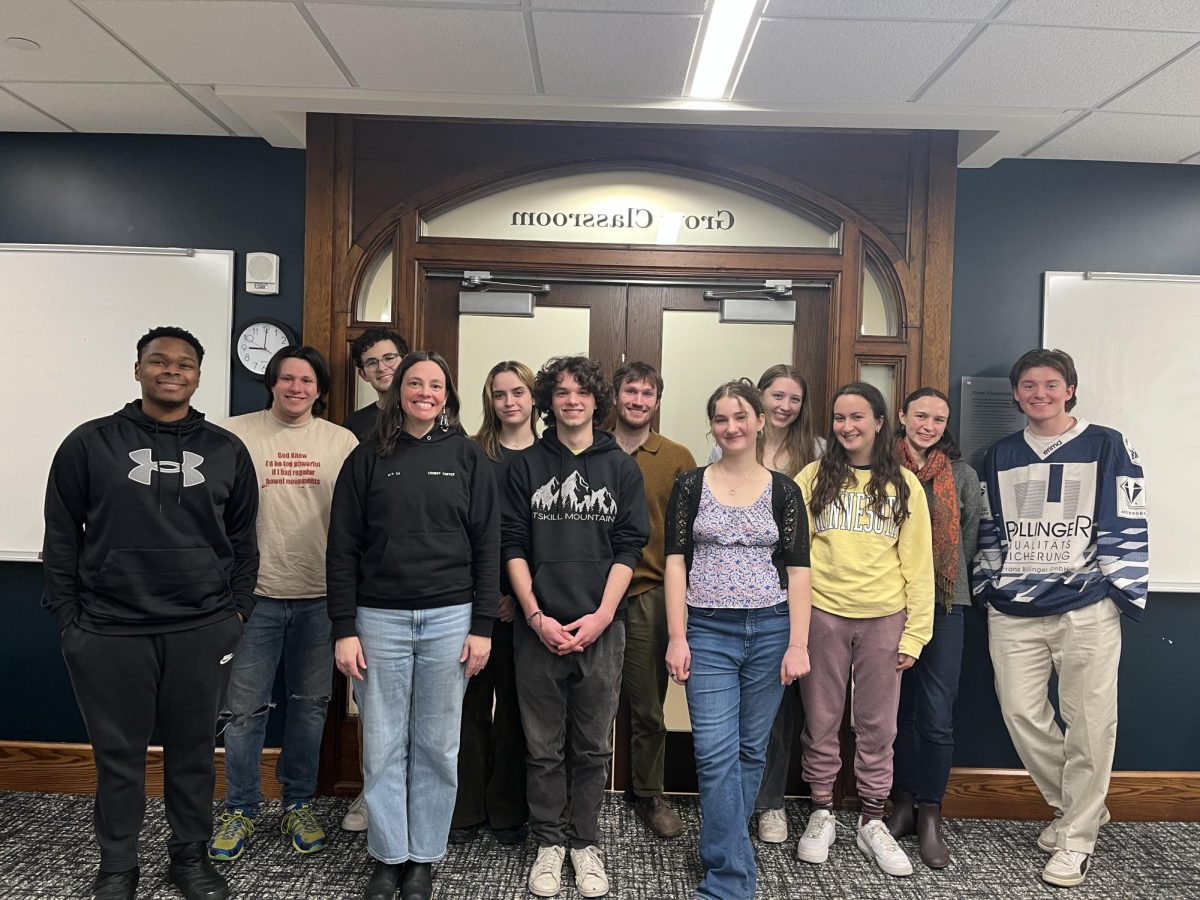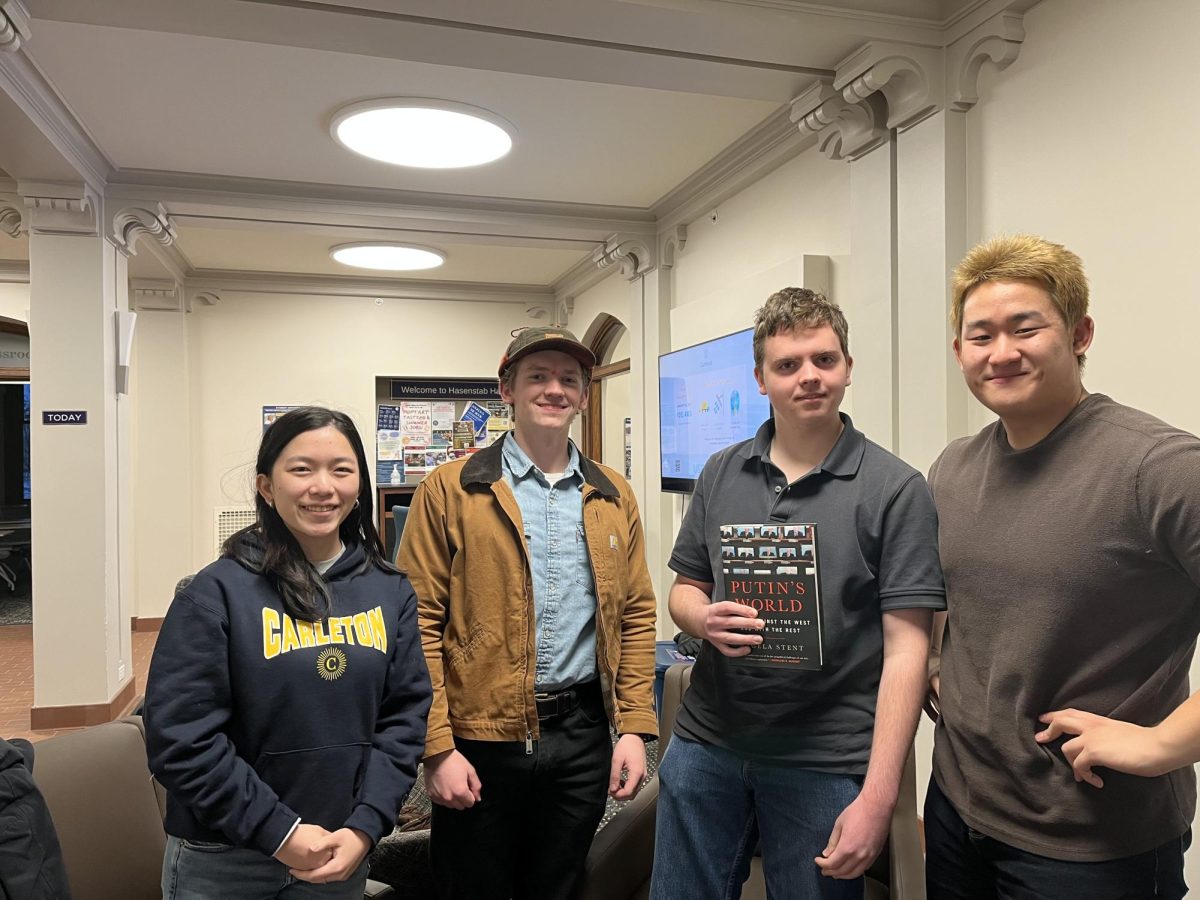On Feb. 4, the Carleton Democrats (CarlDems) held a talk with Rep. Kristi Pursell titled “What’s going on in Minnesota?” Pursell represents District 58A, which includes Northfield, Dundas, Lonsdale, Webster and New Prague. She is currently in her second term in the House after being reelected last Nov., having served since 2022.
In this talk, Pursell spoke on the “truly unprecedented moment” that took place in the Minnesota House of Representatives and answered students’ questions on possible impacts.
Pursell said that the first 2025 session in the House of Representatives, which took place on Jan. 14, was adjourned due to a lack of quorum.
The Minnesota House of Representatives has a total of 134 seats, which were filled by 67 Democrats and 67 Republicans after the election, the second tie in voting history, according to Pursell. In Dec. 2024, the elected representative from District 40B, Democrat Curtis Johnson, resigned after choosing not to appeal a lawsuit regarding his failure to meet residency requirements in the district. The House was then left with a Republican majority of 67 and 133 filled seats.
The Minnesota Constitution states that quorum is based on the total number of seats in the House — 134 — regardless of whether or not they are filled by a representative. Therefore, as was declared by Secretary of State Steve Simon on Jan. 14, the quorum to hold House sessions is only constituted with 68 members.
“One of the [Republican] representatives climbed up, used the gavel to open the session and took control of the House,” Pursell said.
The Republicans argued that, since there currently were 133 sworn-in representatives in the House, the 67 Republican majority constituted a quorum. During the session, the attending representatives elected a Speaker of the House and began developing legislative proceedings.
“It was against the constitution and the law,” Pursell said, stating that the Democrats sued the House Republicans in the Minnesota Supreme Court, which ruled that 68 is a quorum and that the Republicans acted against the state’s Constitution.
On Feb. 5, the Democrats and Republicans in the Minnesota House of Representatives reached a power-sharing agreement, which will restart proceedings in the house with a Republican majority of 67 seats and end whenever one of the parties reaches a full majority with 68 seats. Gov. Walz announced a special election for District 40B, which will take place on March 11. If neither party reaches a majority, they will work collaboratively in committees.
Pursell considered that the situation in Jan. set a negative precedent for the parties’ future collaboration in the House.
“After all of this, how are we going to work together? There will have to be a lot of repair done,” said Pursell to the meeting’s attendees, which included the CarlDems leaders as well as students from all class years.
The talk was mutually organized by CarlDems and Pursell, who have a close relationship due to the organization’s work in Pursell’s reelection campaign in the fall.
“We wanted to have an event to talk about what’s going on here in Minnesota. We’d like to bring things back to the local level, where it’s easier to actually make change,” said Gabriel Kaplan ’25, the CarlDems president, on the organization’s purpose in hosting this talk.
“The power grab by the GOP is a big deal, and I think that’s another aspect to not receive a lot of coverage because of all the crazy stuff going on nationally,” Max Serota ’25, one of the CarlDems vice presidents, said. He added that the meeting’s objective was to “inform students and help them engage a little bit more at the state level, particularly when there’s so much scary stuff happening nationally.”
During the meeting, Pursell emphasized the possible impact of the current situation on the House of Representatives’ legislation. “What we passed in the last two years,” which includes reproductive rights and immigration protections, according to Pursell, “we can’t … let them roll back.”
“We’re governed by Minnesota right now that we live here,” Kaplan said, highlighting that the state’s public policy on different issues is extremely important for all Carleton students.
Pursell assured students that, “Our policies and priorities aren’t changing.”
For instance, after a student’s question on the current climate policy in the state, the representative said that the 100% clean electricity bill passed by the House in 2023 is still in place. Additionally, with the current power agreement in the House, Pursell said in a Feb. 7. Legislative Update that “Democrats are ready to work with Republicans and govern responsibly while not compromising on our core values.” Pursell will begin working as co-chair of the Environmental Committee alongside a Republican representative next month, according to the legislative update.
When asked why she decided to come to Carleton for this talk, Pursell said, “It feels to me like a lot of folks are feeling scared and hopeless …. It’s really important for me to speak to young people to try my best to empower them because despair and fear aren’t great for democracy.”
Despite the situation’s impact on the functioning of the House, Pursell emphasized that “this system is better than an autocracy, an oligarchy or a tyranny,” adding that she believed “we need to reinvigorate our institutions to better represent the people.”
“I work for you,” said Pursell, urging students to hold their legislators accountable in order to ensure their representation of constituents.
“We’re really lucky here to have representative Pursell, who is … willing to interact with students,” Serota said.
“That is not the case in a lot of places,” Serota said. “That’s indicative, more broadly, of representatives who are not willing to listen and engage to their constituents all across this state, and, ignoring the Constitution and the will of the people in order to try to seize power in the way [House Republicans] did.”
In order to ensure the strength of institutions, Pursell highlighted that it is important for everyone to “agree on the rules that its voters who pick the representatives,” and understand that what happened in the House is “against everything that our country and our democracy is.”
Pursell emphasized students’ power to “continue to advocate for policies you’re passionate about,” a sentiment echoed by Serota.
“There’s lots of different avenues for advocacy,” added Serota, citing communication with representatives or lobbying at the state level. “All of them can be impactful to help drive change at the state level, to counteract some things that are happening.”












